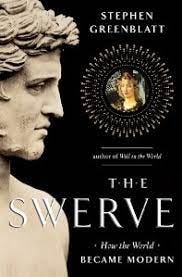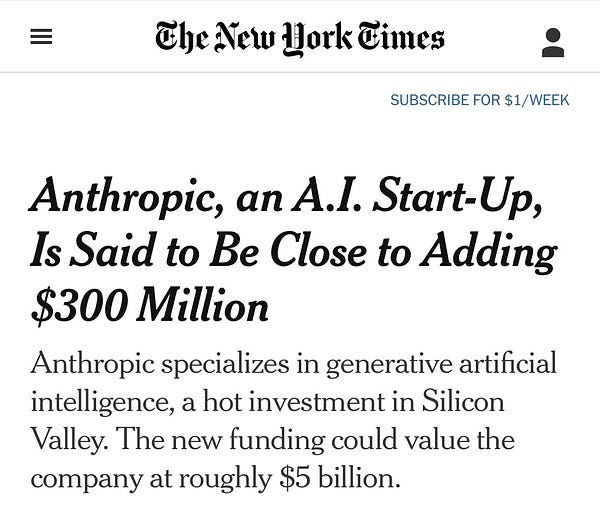AI-as-a-Service, Text to music & Generative AI FOMO already here?
Data ownership battles, AI as a service eating incumbents and some very interesting funding events in the last week are all signs we are in a new AI era.
Welcome to RiD! My side / passion project on all things language AI. It’s basically where you find out today, whats happening tomorrow (hopefully).
Here is the TL;DR list of this weeks newsletter:
Is AI-as-a-Service (AAAS) finally here & those allusive productivity gains?
Text to music is now also here as we get ever closer to “text to…” anything
Copilot gets sued for data usage. The data ownership battle rages on
Various bits and pieces such as the role AI may play in keeping ancient languages alive, plus…
The usual language AI highlights in commercial, technical, ethical and general interest items
Is AI-as-a-Service (AAAS) finally here and will it finally bring the allusive productivity gains the digital era has been missing?
It’s been years in the making, with everyone trying to offer AI as a service but…The Integration of OpenAI, Azure [may well] Bring AI-as-a-Service Into Focus. I can’t tell you how many firms I met with, who said they offered AAAS, when I was in banking and consulting. But it always required deep specialists and a not so small integration lift etc etc. Basically, it wasn’t a service, it was some potentially interesting stuff that required a lot more work to be useful. Then here comes OpenAI and their simple UIs or APIs and boom, a lot of that heavy lift just evaporated. Whisper, ChatGPT, DALL-E etc, all on offer and easy to use.
Are we entering a new phase of the digital era? The latest piece from WIRED lays out the possible case. “ROBERT SOLOW, THE Nobel Prize–winning economist, famously said in 1987 that you can see the computer revolution everywhere but in the productivity statistics. By the end of 2023, AI [may well] be one of the most important factors of production in the global economy”. Read the rest here.
Other recent example includes some mind blowing statistics related to the use of copilot in VS Code. GitHub chief executive Thomas Dohmke claims 40 per cent of the code created by developers who use the service. 40%!!!
Text to…whatever you like.
I honestly think we're probably 6-12 months from anyone anywhere being able to convincingly digitally recreate video & audio of anyone else saying whatever they want them to say. Deep fake is almost upon us.
AI Audio is basically here now. I referenced 11labs last week, who provide (in beta for now), the ability to synthesize your voice from ~1 minutes of audio and have it read whatever text you give it.
So what else did we get this week? Text to music is now here. And it’s impressive. Not off the charts but impressive and like everything else, improving exponentially.
There are some more basic text & picture to video capabilities out there (see below link to Meta’s latest) but I expect the ability to create a video based on the upload of a single picture plus a text prompt, is just around the corner.
So as of now AI / robots can…(checks notes):
Read & write
Talk - 11Labs, WellSaid (who I using myself @ Bundlr. Check them out. Very polished text to speech service.)
Hear
See
Dance / navigate the physical world
Here is the latest from google & Meta on text to music & video.

The data and content ownership battle expands
While not a completely new story, this week Microsoft, GitHub, and OpenAI pushed back against a class action complaint that accuses the companies of scraping licensed code to build GitHub’s AI-powered Copilot tool (the aforementioned coding productivity tool). The defendants claim “Copilot helps developers write code by generating suggestions based on what it has learned from the entire body of knowledge gleaned from public code”.
This however comes fresh off last week’s news about a text to image generation law suit. As I said last week, this conflict between models trained on mountains of content distributed across the web and the creators of that content i.e. “the public”, is helping bring data ownership to the fore is a very interesting and possibly more meaningful way than the more vague discussion of social media usage of user data.
This evolving story represents the confluence of many broad themes emerging in the new generative AI era such as barriers to entry, centralized power, public ownership and control. OpenAI was once a non-profit created to democratize the power of AI but ultimately turned private so it could source the funding it needed to keep moving.
Other bits & pieces:
Will translation AI play the role Italian monks did in the dark ages and keep “the ancient” alive”? One of my favorite books over the years has been:
It an amazing tale of one of the great ironies and accidents of history which ultimately had a profound impact on all of our lives and the world we live in today. Anyway…per the link above, AI may be a key tool in keeping some other soon to be lost cultural phenomena alive. Here is another great example of AI playing an important role in this regard.
The monetization model for OpenAI is taking shape. Of course they will be enabling Microsoft to monetize through integration to existing products however by offering AAAS (see above) there are a lot creators and corporations dying to plug straight into these APIs.
I mentioned reinforcement learning from human feedback (RLHF) as a possible key component of various specialized generative AI use cases and here is a good primer for people wanting to get up to speed quickly.
Google Brings Back Founders Page, Brin to Fend Off ChatGPT Threat. I am still convinced this story more a media narrative than a reality but it’s an interesting media narrative nonetheless and worth tracking. Here is a decent (not great but decent) overview that touches on various points around this discussion and why Google has many cards to play in this space.
Basic market data tracker:
Yeah the Microsoft OpenAI deal just increased life to date language AI private market funding by ~130%!! We’re in a different phase now.
Happenings this week:
Commercial:
Exciting news for Anthropic, a possible OpenAI competitor with a focus on more “ethical” and “non-bias” AI…
But less great news for SoundHound, who earlier this month laid off 40% of its staff, announced this week that it had raised $25 million in equity to shore up its position in the market. I think this is a possible canary in coal mine, where AI as a service is possibly going to eat these prior AI language unicorns.
A newly formed seed level start up ChatGPT Tips, seems to have somehow raised $10mm, by offering…”tips and guides on using the ChatGPT software”. I mean come on! So I looked up who funded it, and god damn it, it’s Sequoia Capital!
Is this some serious FOMO or am I missing something? The whole idea of prompt engineering is interesting but seems fleeting, so what are they offering? $10mm? That hurts.
Other funding events:
aiOla raises $25 million to interface natural language to AI solutions in traditional manufacturing
DeepL takes aim at Grammarly with the launch of Write, to clean up your prose.
Sprout Social acquires Repustate
Technical:
AI21 Labs rolls out co-writer feature, to help spice up writing. Is Grammarly in trouble?
Kind of silly headline but somewhat useful list - Top 10 Leading Language Models for NLP in 2023
Ethical & other
Generative AI increasing risk of cyber attacks? The Davos set think so.
New research reinforces its ethical use of AI in chat-based candidate screening.
The AI Ethics War Will Make the Content Moderation Debate Look Like a Picnic
»»»»»»»»»»»»»»»»»»>










